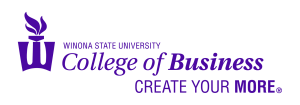 Wandering around Somsen Hall on a Friday afternoon, you don’t need to reach the third floor before you smell the savory aroma of homemade food. Walking up the stairs, you hear excited chatter and comradery in the center of Winona State University’s Business Administration department. Students gather around, their conversations carrying cheerfully through the halls. You’ve just stumbled upon the Supplemental Learning Sessions.
Wandering around Somsen Hall on a Friday afternoon, you don’t need to reach the third floor before you smell the savory aroma of homemade food. Walking up the stairs, you hear excited chatter and comradery in the center of Winona State University’s Business Administration department. Students gather around, their conversations carrying cheerfully through the halls. You’ve just stumbled upon the Supplemental Learning Sessions.
These weekly get-togethers are organized by Dr. Patrick Paulson, a Professor in the Management Information Systems (MIS) Program at Winona State. The sessions were created as an opportunity to explore the world of MIS and, as such, have an open-door policy for MIS students, prospective WSU students, and pretty much anybody who happens to be walking by and is interested in good food and good conversation.
The Management Information Systems (MIS) major at WSU strives to demonstrate how to integrate technological systems, databases, and data processing techniques into the field of business. Many students who are interested in MIS seek to become skilled at computer processing and data configuration and to develop their skills using technology for businesses. Students who graduate from Winona State with a major in MIS can become software engineers, computer programmers, database specialists, and other specialties.
Paulson brings firsthand industry expertise to WSU’s MIS program.
“I never planned on being a college professor!” Paulson said, laughing. “I was a Mechanical Design Engineer for General Motors and General Electric. I worked on locomotive and airplane engine parts.”
After moving to Minnesota from Chicago to work with a supplier, Paulson ended up teaching databases at Winona State in January of 2000.
“I had seen in my life what the change in technology had done to what we could do in engineering and business,” he explained. “I thought, well I’m just going to make use of the resources, and this school has incredible resources.”
The origin of the Supplemental Learning Sessions dates back to fall 2015, when Paulson sought out and received approval to install new advanced monitors for his classrooms. That winter he received the monitors but quickly realized that his students might be overwhelmed with the new technology.
“You can’t just plug in your laptop and all of a sudden the monitors work,” he explained. “You have to know how to configure them, and same thing with web conferencing. There’s a learning curve to it.”
To help students overcome these struggles, he devised a plan to host open houses on Fridays from 11 a.m. to 5 p.m. Dubbed the “Supplemental Learning Sessions,” the events quickly became popular with students, especially after Paulson’s wife, Mary, volunteered to make food for the students.
The sessions are intended for students to come in to discuss homework, inquire about the MIS program, receive advising help for classes, or even just socialize with other students and faculty. They serve as an open forum to support student-professor relationships, which Paulson said are absolutely integral to the students’ academic success.
MIS is a difficult field that can easily feel overwhelming, he explained. Having the opportunity to talk openly with professors and peers in the program provides a level of support and helps to reassure students that they’re in this together.
“I try to be a role model for the students… this stuff is not easy,” he said. “One thing I always caution students about is getting an answer doesn’t mean anything. You have to go beyond the data and understand what it means.”
MIS Teaching Assistant John Salo, a senior majoring in MIS and accounting, described how the sessions have affected his own academic progress.
“I learn by teaching, so every student I help reinforces what I already know,” he explained. He added that helping students troubleshoot their issues has heightened his skills in problem solving and innovation—skills he feels will be very valuable in the workplace.
The sessions are also a great way to get to know people in the program, Salo said, peers as well as professors.
“(The sessions offer) a low/no stress atmosphere to meet and greet and just chat,” he said. “It helps students realize that professors are people first, and that the professor title is just that, a title.”
Emily Ashland, who also serves as an MIS Teaching Assistant, thinks the Supplemental Learning Sessions have helped the department build community.
“This is a pretty popular event, especially when Dr. Paulson’s wife brings homemade food in,” said Ashland, a senior majoring in MIS and minoring in Data Science. “The room has many great resources that are available for students to use. Whether you’re an MIS major/minor or not, the Supplemental Learning Sessions are a time when anyone can come, eat some good food, work on homework, or just hang out.”
Paulson’s idea for Supplemental Learning Sessions started with a simple homework help session but has now evolved into a social and community event with an even larger purpose. Students and professors across the campus are invited to socialize about the future of business, MIS, and computer programming. Potential students, other business majors, and even just hungry students are invited to participate in a welcoming place of interaction about the future.
About the WSU College of Business
“Create Your More” with the innovative, high-value business programs offered by the Winona State University College of Business. With seven undergraduate majors and 10 minors, and programs that intellectually engage and challenge students, the College of Business equips graduates for lifelong success in the global community. Our students benefit from direct experience in real business situations, and take advantage of internship programs, company tours, business and industry guest speakers, and research opportunities. The college has 46 full-time professors who are committed to fostering an engaging and supporting learning environment that utilizes the Winona and Rochester business community to provide innovative curricular and co-curricular experiential learning. The college is accredited by The Association to Advance Collegiate Schools of Business. To learn more about the WSU College of Business visit winona.edu/business.
Founded in 1858, Winona State University is a comprehensive, regional public university with approximately 8,000 students on campuses in Winona and Rochester. Around half of WSU students are first-generation, meaning neither parent has a four-year bachelor’s degree. The oldest member of the Minnesota State system, WSU offers more than 80 undergraduate, pre-professional, licensure, graduate and doctorate programs in five colleges: Business, Education, Liberal Arts, Nursing & Health Sciences, and Science & Engineering. Winona State is ranked as the second public institution in Minnesota by U.S. News & World Report’s “Best Colleges,” has been named among the “Best in the Midwest” by The Princeton Review for 15 years in a row, and has been featured as one of America’s 100 Best College Buys for quality and value for 23 consecutive years. The University generates $447.9 Million in annual economic impact. The University’s mission is to enhance the intellectual, social, cultural and economic vitality of the people and communities we serve: a community of learners improving our world. For more information, visit winona.edu.

